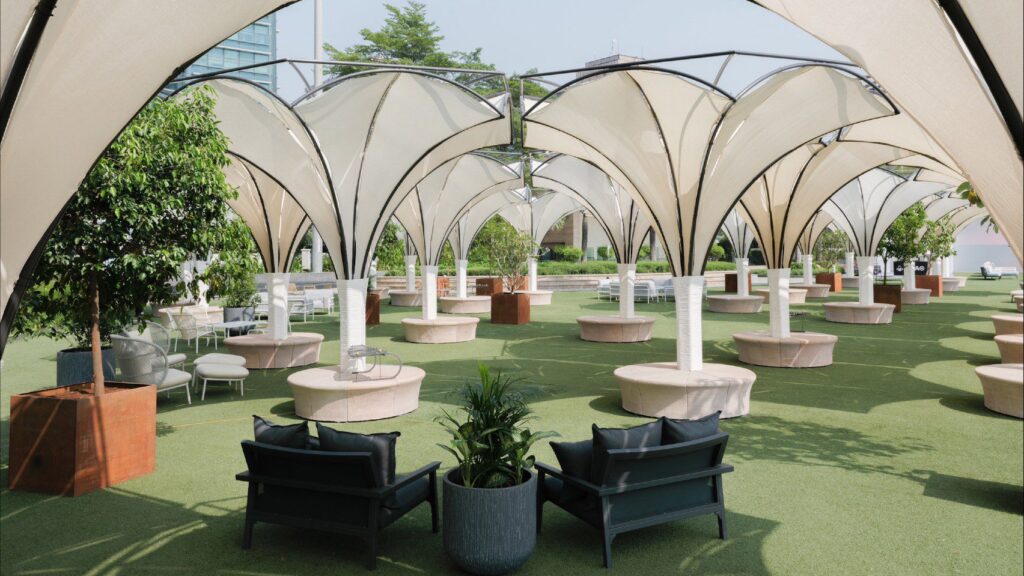[ad_1]
Architecture practice Studio Saar has created a lily-shaped, reusable pavilion called Srivan, which was unveiled at Design Mumbai last month.
Built to cover the breakout area for visitors to the trade show at the Jio World Garden in the heart of Mumbai, the pavilion was named was derived from Hindu principles that describe Srivan as a “forest of prosperity”.

“Srivan tells the story of craftsmanship, using simple, natural, reusable, and recyclable materials to create a pavilion that will provide shelter and delight Design Mumbai visitors during their visit to the fair,” said Studio Saar managing partner Ananya Singhal.
“It represents the traditional holistic thinking that still informs sustainable architecture and design in India.”

The structure was formed of 33 hexagonal modules, which the studio described as “lily-shaped”, arranged in an irregular pattern.
Each module was supported at the base by a plinth made of pink Rajasthan stone, which also doubled up as a seat. Additional seating was provided by local outdoor furniture brand ABACA.
Tubular steel structures supported in the base held sheets of Khadi – a coarsely spun cotton fabric made in India – to create a petal-like form.

The fabric was used both in its natural form and dyed, using soapnut and tea. This was undertaken by Aavaran, an Udaipur-based social enterprise specialising in natural dyeing.
At night, light fixtures integrated into the steel structures projected a soft light onto the fabric, making the pavilion glow.
Singhal told Dezeen that one of the biggest challenges the team faced in putting the pavilion together on site was logistics – especially because the show took place right after a national holiday.
“It is a big installation and a heavy one, due to the use of heavy stone to prevent the lilies from toppling with heavy gusts of coastal winds,” he said. “Design Mumbai was just after Diwali and this meant that we needed to co-ordinate logistics before Diwali and get a large team on site to finish things on the day after Diwali.”

Studio Saar also collaborated with The Stonemasonry Company to design a set of six lithophones made of black marble. These were dotted around the pavilion with the intention of having visitors interact with them.
Srivan was built to be easily demountable and fully reused in line with circular economy principles. The modules were not only slated to be reused for other travelling exhibitions,but will also be used to cover outdoor breakout spaces within the manufacturing campus of Secure Meters.

Frangipani and ficus trees, which were interspersed throughout the pavilion, will be donated to schools in Mumbai and Udaipur.
“Embodying the shared labour of 200 stonemasons, weavers, dyers, metalworkers and other craftspeople, each component of our pavilion will find a new life beyond the four days of Design Mumbai and will continue to serve different communities across the country,” said Singhal.
“There is a significant appetite for sustainable thinking in the built environment when it is tied with good design. People want both and there are lots of opportunities to deliver both.”

Studio Saar is an architecture and research practice based out of India and the UK. Led by Singhal and Jonny Buckland, the practice recently won Emerging Architect of the Year at the Dezeen Awards 2024.
Other outdoor structures designed by the practice include a canopy of colourful birds that sits on the banks of an Udaipur lake and their collaboration with Webb Yates for a timber pavilion during the 2023 London Festival of Architecture.
The photography is by Aman Alam.
[ad_2]
Source link

